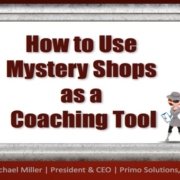Senior Living Mystery Shopping: Lessons Learned From 100,000
Senior Living SMART recently interviewed Mike Miller, CEO of Primo Solutions, to discuss senior living mystery shopping. He has mind-blowing data gathered from doing over 100,000 mystery shops (phone and in-person) of senior living sales professionals.
Let’s dive into the results of this senior living mystery shopping.
RESULT: 90% of questions asked by the Sales Counselor are closed-ended questions, which makes it nearly impossible to build rapport.
SLS: What are some of the best open-ended questions that every sales counselor should ask?
MM: I normally do not provide a list of open-ended questions because it can be different for everyone. However, one of the best questions I love to ask the adult child/family member is this: “When you are not taking care of mom/dad, what are some of the things you enjoy doing?” Not only does this open the door to building rapport with the adult child, but it also puts the sales counselor in a closing posture. Saying that, I am including a list of “Starter Questions” that sales counselors can use to get a conversation started as well as transition through the sales process.
RESULT: 98% of the Sales Counselors talked more than 70% during the entire call.
SLS: How can sales managers train/ coach to improve this?
MM: This can easily be improved by asking more open-ended questions, which force the prospect to answer with more than 1 or 2 words.
SLS: What do they talk about? Is it feature-dumping/ laundry listing?
MM: Yes, it is features dumping. After asking just a couple of questions, most sales counselors jump right into presentation mode. They share everything there is to know about the community. The problem is that they never discovered the true needs (both physical and emotional), so most presentations are not specific to the prospect and that is a huge mistake.
Watch the Recorded Webinar: How To Use Mystery Shops as a Coaching Tool
RESULT: 45% of the time, the prospect was asked to visit the community in the first two minutes of the call. No rapport or discovery was attempted. How do you think this made the prospect feel?
SLS: Are there any stats about how many questions sales counselors typically ask before trying to close for the tour?
MM: This is a great question and it really does depend on the personality of the sales counselor and the amount of training and coaching they have received. But if I had to put a number on it, I would say they typically ask 4-5 questions. Although asking too few questions is a problem, asking the wrong questions compounds that problem. Most of the questions being asked are questions that qualify or disqualify a prospect from moving into the community.
RESULT: The receptionist asked for the caller’s name only 20% of the time.
SLS: Is this getting worse?
MM: It seems to be getting a little better for those companies who are actually investing in the front-line staff members who answer the phone. However, the industry as a whole is not getting any better. Many times the caller is put on hold and then just transferred to the sales counselor. This one “little” thing can make the difference in creating a good first impression.
SLS: Do you offer training on this?
MM: When we are brought on to conduct sales training for a company, many times the concierge and management is included in the training. However, one does not need professional training to learn how to properly and professionally answer the phone, and then how to handle the call. A little bit of guidance from the ED or sales counselor can go a long ways.
RESULT: 35% of the time, prospects did not get answers to their questions on the first call.
SLS: Why is this?
MM: This statistic is actually derived from call backs. The first time a prospect calls a community, they think they have an idea of what questions to ask and what information they need to gain. However, as we all know, it is an educational process.
Sales counselors need to ask questions that lead to an outcome. They need to ask questions to guide the prospect to start thinking about for more than what they called in. However, it normally takes several calls to other communities before they start piecing together the questions they did not even realize they needed to ask. The bottom line is that most of our prospects do not know what questions to ask when they call in. It is the job of the sales counselor to help them identify those questions, needs, and solutions.
Download ‘Questions to Use in the Inquiry Process’ checklist
RESULT: 60% of the Sales Counselors used the brochure as the close.
SLS: Why? Have they disqualified the caller as not being hot/ urgent enough so they call back to the brochure?
MM: After the initial call, if a tour has not been scheduled, the sales counselor immediately offers to send a brochure. The problem is not the sending of the brochure. The problem is that they are not gaining a commitment to the next step. Perhaps the prospect needs to share the information with a family member, or they need to call a few other communities. There could be a number of reasons why the prospect does not agree to a tour initially. However, there still needs to be a next step, e.g. follow up call.
SLS: Do they not have other options: tour, lunch, event, home visit, support group, etc.?
MM: There are a number of different options. It just depends upon the objection given by the prospect. Many times the sales counselor does not even ask for the close, because they have not earned the right and therefore do not feel comfortable. So, they revert to sending a brochure. I am a firm believer that you need to earn the right to ask for the close. However, even if you have not earned the right, you still ask for the close. The truth is that most sales counselors are not earning the right to ask for the close. So, just ask!
SLS: These statistics obviously show there is a lot of room for improvement in the discovery process. Has anything changed in the last 5 years?
MM: There has been a significant amount of talk about changes in the industry. You cannot attend an industry conference without hearing about changes. The place where I have seen the greatest change is in technology. The problem is that technology is not the fix to creating a sales culture in your organization. This industry requires a sales process that is founded on relationship building principles. We do a good job of talking about these principles, but we do a poor job of implementing them.
SLS: Are there trends that we can learn from?
MM: There are certainly some key trends that we can learn from, and they are not industry specific. The first thing we need to do is invest in our people. When it’s time to reduce budgets, normally the training budget is the first thing cut. This is a huge mistake. A training program that is implemented correctly can create a sales culture, increase closing ratios, and decrease turnover.
The second thing we need to do is hold our people accountable. If you make the commitment to invest in them, then make the commitment to hold them accountable. Third, you need to have follow up and follow through measures in place. Training your people once a year will not create any changes. There needs to be ongoing training and coaching. There needs to be tools in place, e.g. mystery shopping, that identifies specific areas of opportunity. Then you reinforce those areas of opportunity with more coaching and training.
SLS: What kind of senior living sales training/ coaching has the best impact on improving skills?
MM: Although there are a number of training processes, I believe we should be using a process that is specific to the senior living industry. Once the sales process has been identified, then you need to ensure specific skill sets are being trained. There is a lot of training out there that tells you what you need to do, but they don’t tell you specifically how to do it. Any trainer can tell you that relationship building is crucial to the sales process, but don’t just tell me – show me. I am not a huge believer in inquiry forms, primarily because the sales counselors are not trained on how to properly use them. The majority of the time, the inquiry form turns the sales process into more of an interview or interrogation.
Additionally, since most of these inquiry forms have pretty much the same questions, the prospect is getting asked the same questions regardless of what community they are calling. When a sales counselor asks a question, they should not know what their next question will be until they have heard the answer. The question should be based off the answer because that is how you are going to get below the surface to the emotional level. The inquiry form seems to be more of a hindrance than an assistance.
SLS: Of the best performers that you have shopped, what are the common characteristics and behaviors that set them apart?
MM: First, they build rapport with the person who is on the phone (normally the adult child). This rarely happens but when it does, it transforms the call completely. Second, the call sounds like they are having a normal conversation with a friend. If they are using an inquiry form, it is certainly disguised by the sales person’s ability to drill down and ask deeper questions. Third, all of the best performers are great listeners. They listen with intent and pick up on key phrases that allow them to dig deeper until they get to an emotional level. Our prospects ask us about the logical things, but they really care about the emotional things.
SLS: Do you ever shop EDs or back up teams/ MOD? Anything we can share about those shops?
MM: We do have clients that shop their EDs and back up teams. Many clients even conduct phone shops after hours (nights and weekends) to see how the calls are being handled. If you have contact with the prospect, you should be getting shopped. As you can imagine, the EDs and backup teams typically score significantly lower than the sales counselor. The main reason is because they are not provided the necessary training to handle an inquiry. I am not saying they need to master the sales process like your sales counselors, but they need to be armed with enough skills to properly handle the call without losing the lead.
Senior living mystery shopping is one of the most cost-effective tools you can invest in that could provide a very large return. If you don’t measure it, you can’t expect it.
Primo Solutions Mystery Shops & Sales Training
Primo Solutions, LLC is a full service Mystery Shopping, Training, Marketing, and Satisfaction Survey company, providing quality follow-up and follow-through measurement tools to evaluate your sales, customer service, and other team members.



